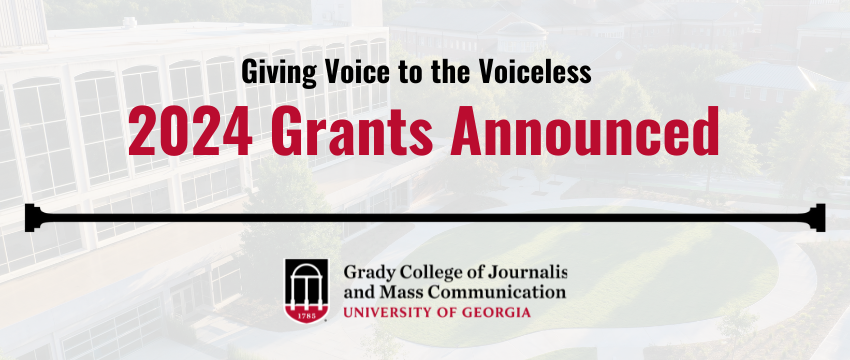2024 Giving Voice to the Voiceless grants announced

2024 Giving Voice to the Voiceless grants announced
Projects that use music to benefit dementia patients, help Atlanta public school students express their identities and provide an outlet to combat name-based discrimination in science are just a few of the recipients approved for 2024 Giving Voice to the Voiceless grants.
The GVV grant program was created and initially funded by Charlayne Hunter-Gault (AB ’62) and Ronald Gault to support projects by UGA students and faculty members that amplify marginalized people or issues, advance social justice and create bonds of empathy and understanding.
Nearly $13,000 in grants amplifying marginalized voices were awarded in 2024.
Eight projects were funded this year including “Sound Memories: How memory choirs are changing the way we care for people,” by Mercedes Kane, a UGA MFA Film student. Kane is producing a documentary film and written piece about how dementia patients benefit when they sing in memory choirs. Her research shows group singing draws upon brain systems unaffected by dementia.
“I am so thankful to UGA for awarding my work with the Giving Voice to the Voiceless grant,” Kane said. “This generous grant will assist funds for my reporting and filming, helping to give a literal voice to people across the country living with memory loss.”
Wen-Jen “Jonathan” Lin, a graduate student in Franklin College, is the recipient of another grant that researches discrimination of scientists based on their Sino, or Chinese, names. Research has shown that works by scientists with non-Anglo names are less likely to be cited and quoted by journalists, and emails sent by prospective graduate students with Sino names are less likely to get a response.
“To me, receiving this support from Grady is in itself a big step in validating the experiences of people who have dealt with or are currently dealing with name-based discrimination,” Lin said. “I hope that all the projects funded by the Giving Voice to the Voiceless grant can provide a sense of validation to the people they reach.”
A complete list of GVV grant recipients is as follows:
- Voices from the Past: A Journey into the Histories of the North Oconee River (Michelle Ritchie – College of Public Health, Jane McPherson – School of Social Work) The GVV committee supports this project to support a student tasked with creating “journey” boxes for teachers and eighth grade students in local public schools, including Clarke County. The journey box will contain artifacts and photographs that tell the stories of the Oconee River and its inhabitants and cultures.
- Centering Black Survivor Voices (Kasandra Dodd – School of Social Work) Dodd was awarded a grant to support research exploring the intersection of sex trafficking within the child welfare system in the United States, with a specific focus on Black women and girls. GVV funding will assist with research expenses as Dodd determines how Black feminist theory explains the phenomenon of why Black women are overrepresented within the child welfare system, which, in turn, contributes to increased trafficking vulnerabilities.
- SINO in STEM (Wen-Jen “Johnathan” Lin – Franklin College) The objective of this project is to produce interviews with scientists at UGA who have names of Sino, or Chinese, origin and to share their stories of name-based discrimination on a custom website. The committee awarded funds to encourage discussions of linguistic and familial origins and conduct interviews.
- Sound Memories: How memory choirs are changing the way we care for people (Mercedes Kane – Grady College) Kane is working on a feature article about a “memory choir” movement promising to change the dementia care conversation. Her research shows group singing draws upon brain systems unaffected by the dementia. The story will bring dementia in all communities to the forefront. GVV funding will help Kane document preparations for an upcoming concert, bringing life to research and effects of social singing on chorus members and their caregivers.
- Uncovering the Pillars of White Supremacy Culture (Apoorva Sarmal – Franklin College) This project aims to capture how subtle cultural norms perpetuate white supremacy values. Sarmal’s research aims to create, validate and implement a white supremacy culture scale that will address the structural underpinnings in areas such as higher education. The GVV committee awarded a grant to help offset costs associated with presenting this research at national and international conferences.
- Who Am I? (Susan Cardin – College of Education) The GVV committee awarded a grant to empower students participating in the Horizons Atlanta program to express their identities through storytelling. Horizons Atlanta supports public school students who are facing educational inequities. Their mission is to bridge the achievement and opportunity gaps while fostering self-confidence and positive self-image. The objective of the GVV project is for students to recognize their significance in school, families, community and world.
- “We Live Here” – Athens Anti-Eviction Storytelling (Jess Martinez – Franklin College, Vanessa Raditz – College of Education) Martinez and Raditz are working together on a documentary about the intersectionality of housing issues in Athens. The film will focus on the purchase of nearly 800 affordable housing units by an out-of-state investor in 2021. The purchase prompted an unprecedented mass eviction of long-term Athenians, particularly those who rely on federal rental subsidy vouchers or social security income. The committee awarded a grant to offset filming costs.
- You Go Girl: The Importance of Higher Education among Black Women (Tyra Hill – Grady College, SPIA) “You Go Girl” is short film documentary highlighting the importance of higher education among Black women. The film features six Black women and their experiences in college. The committee awarded this grant to assist with copyrighting and film festival submissions.
Author: Sarah Freeman, freemans@uga.edu